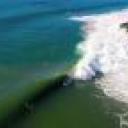What is your beach worth?


Could be difficult to classify surf spots across the country against each other as some locations are surfed daily (like D'Bah) while others are much less often. Obviously a surf spot surfed every day is worth more than a spot you surf once a year. But if the every day wave is not that good overall does it reduce the value?


Hi Sandspit
The intention isn't to try and say that some beaches are worth more than others, though we'll certainly come up with different dollar figures for them.
It's more to get a handle on how beaches are used, and what that means in economic terms.
People make tradeoffs in time and money when deciding where to go. That's actually how we work out the value of natural resources, as you don't pay an entry fee. We construct a model that matches how frequently people visit with the costs of attending, both time and money, and use this to attempt to value the extra unpriced benefit they get from the trip.
You've touched on a topic that is central to valuing natural resources, and that is the expected benefit (economists call it utility)of a trip. This is what determines people's travel (subject to them having money and time to spend).
Surfers and tourists are prepared to spend time and money to get to world class waves and great beaches. They also have higher expectations of the experience. e.g. if you went on a boat trip to Sumatra and got 3ft onshore waves, you'd be upset. At your local, that might be okay.
They are prepared to spend less to get to waves they don't rate as highly. (Not saying I don't rate D'bah)
Another thing to consider is consistency, D'bah is one of the most consistent waves on the east coast. So while people might not travel as far, and their costs might be less, a lot more people would travel there over a year.
We don't really know yet, but this might add up to a bigger total.


Dave,
In the past I've had reason to read and follow the research done by Jess Ponting regarding surf tourism. Are you aware of him? If not, among (many) other things Ponting looked into the economic value of surf tourism in developing countries. Great work though it has a dangerous flipside as once an economic value on surfing is reached it is then ranked against other competing interests. And if it comes up short?? The result won't always be the one we seek.
What happens if we as surfers think we contribute a lot to the economy and to the local environment but via surveys such as this it's discovered we actually don't? It would seem to me we've lost any bargaining power or political sway.
Dangerous territory if you ask me. I'd rather politicians just THOUGHT surfers had clout rather than discover we don't.


Hi Bells.
Yes, I know of Jess' work. He's done some great stuff on the impacts of tourism (positive and negative) on the Mentawais in particular.
I very much like his Surf Credits idea: www.theinertia.com/surf/surf-credits-new-surf-philanthropy-project-launc...
To answer your question, that's not a problem I've encountered yet. The figures that have arisen from previous work done by our research team (and pretty much every international example I can think of) suggest beach and surf recreation values that compare fairly favourably with the costs of management and the revenue streams from alternative pressures.
Our own research has identified recreational use values (which are only a component of the total value of a natural resource) in the tens to hundreds of millions per year, often for a single beach.
My experience as an environmental scientist attempting to influence policy decisions suggests I'd rather be armed with the economic information, than not.


Hi Dave, Have just filled out your survey. In survey terms one question is a little tricky; when discussing whether coastal erosion might make me go to another beach, this doesn't ask if I might still go to a 'vanished' beach, if the surf was reasonable. Am happy to leave my towel on a dune. Good luck with the research. I suspect when combined with economic activity (board/wax/clothing/leggy purchases, transport and the like) beach contribution to the $$ of our society is quite large.


One major challenge I had filling out the survey was that about 80% of the time I go to the beach by myself to go for a surf, and the other 20% of the time I take my wife and small children. I value very different things (and go to different beaches) in each case.


j202h2n, I have the same problem. We haven't figured out a way to program that into the survey yet, without adding a lot more questions and making the survey more complicated. In the end, it's a balance between richness of information and simplicity/practicality.
We will have another stage of the research where we can go into those types of differences in more detail.
Jules, do you mean that you'd leave one eroded beach to go to another eroded beach, but with better surf?
In that case, you've come up with a response we hadn't anticipated. I'll see if it can be tweaked to have that option.
If you mean that you'd stay at the eroded beach you were at, if (and only if) it had good surf, then that option isn't explicitly included either. Thanks for picking it up.


is spain they call a beach a playa


Hi Dave - the second. I'd stay if the surf was good.
Growing up surfing Little Av has to be good for something other than late drops.


I think Jules' point highlights the fact that 'erosion' means something quite different to surfers. Whereas most people worry about the width of the beach or the distance between the water and the backyard, surfers are more concerned about the state of the sandbanks under the water. Anyone who's surfed for more than a couple of years has seen sandbanks come and go with different seasons, El Nino/La Nina cycles, flood, drought, storms and so on. I used to live close to a tiny little bay that would sometimes have a little strip of sand pretending to be a beach for a few weeks of the year and sometimes go for a couple of years without any beach at all. But whether I surfed there or not depended on the state of the sandbanks further out in the bay.
I bring this up because a lot of measures intended to 'prevent erosion' (particularly the ones that appeal to the owners of beachfront properties, like dumping a whole bunch of rocks in front of the dunes) actually have the effect of accelerating erosion of the sandbanks in the surf zone. This is bad for surfers, but ultimately it is bad beach erosion too, because the sandbanks disperse a lot of wave energy before it reaches the beach.
I recently moved back to Australia after five years living in Japan, where I saw a LOT of coastline on different surf trips. A huge proportion of their coast has been covered in concrete, and while occassionally a break wall or a jetty has created a surfable wave here and there, older surfers told me a lot of stories about good waves that had been destroyed by dumb erosion control.
I feel that a lot of the time trying to fight erosion is a waste of effort, but if councils or anyone else are going to trying to do something, then their plans have to take into account what happens under the water, how it effects waves, and how all of this interacts with beaches and dunes etc. In fact, tackling the 'problem' /before/ the wave energy reaches the beach might well be more cost effective. And with good design and a bit of practice, it might even be possible to produce some surfable waves in the process, which would bring some benefits to the local communities.
For example, the sand dredging of the Tweed has produced the Superbank, but it has also had a negative impact on some of the other spots further along. One option I'd like to see investigated is extending the pipes further along the Gold Coast, with multiple adjustable outlets, so that if there was too much sand in one location then that outlet could be turned off, and the sand redirected to places that could use it (including, perhaps, sandbanks in deep water that could act as bombies in big swells). Might not be practical, and would need some consultation to keep everyone happy, but might be worth looking into.


Jules, in programming the survey we thought that given your response you would have said "No, I wouldn't be prepared to pay", then said "I am not affected by loss of sand" when asked why.
But I can see an argument to having an additional option along the lines of-
"I wouldn't need to, I'd stay where I was if there was surf"
j202h2n -
You're absolutely right. Until I had kids I didn't care at all about the exposed sand, except when fishing.
You're also right to say that most measures to prevent shoreline recession that involve putting something hard in the way will disrupt the natural patterns of erosion and accretion.
This area of research came about in a large part because 'soft' measures that don't cause loss of beaches and sand from the nearshore system (e.g. nourishment, dune rehab, offshore structures, retreat), are typically more expensive in the short term than protective structures, at least for the same level of protection. Also, the costs and benefits don't flow to the same people, or at least not obviously*.
In an economic climate where all decision makers have to look at the business case of investments (and justify them to their constituents) this means they can seem more appealing, if the loss of recreational and amenity benefits are not included in the calculations.
Our research attempts to value these benefits, in an attempt to make sure apples an apples are being compared.
*There is actually a fair bit of research to show that without the sand, the beachfront properties will be worth a lot less, so it is likely to be in the interest of the property owners (and councils/Govt. who rely on the rates and land tax revenue) to preserve sandy shorelines.
Stay tuned for an upcoming article on some related research, using some different methods.


@Mrs Brad Pitt, Sand as the Romans used in the Colosseum say is called "harena, a particularly fine/smooth sand used to absorb blood in ancient arenas like the Colosseum in Rome." from which I believe , the word arena is derived. A totally opposite sort of playground?

What is your beach worth?
What about your surf break?
Simple questions, eh? Well, a team of researchers from Bond and Griffith Universities are trying to answer them, but they need our help. They've developed an online survey to let you have your say in the management of the coast. Governments of all levels need information like this to help them make decisions about coastal planning, development applications and day-to-day management of these resources.
See the latest Surfpolitik article on North Narrabeen for an example of surfers being affected by govt decision making.
To take the survey, go to www.mybeachmysay.com and click on the link (only takes a moment).
David Anning, a Senior Researcher at Bond Uni and long-time surfer, will be monitoring this thread. If you've got any questions regarding the survey or how the methodology applies to us then pipe up and Dave will endeavour to answer your questions.